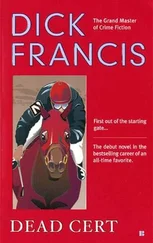He looked at me in a manner that suggested he knew that and still would have preferred to have been there just the same.
“Martin and I were ill on Friday night as well,” said Jean. “I called an ambulance because he was so bad.”
“I was also meant to be at the racetrack on Saturday,” said Martin, “but they didn’t let me out of the hospital until about one and it was too late by then.” He looked at me for reassurance.
“It’s fine, Martin,” I said. “I wouldn’t have expected anyone to come to work after being so ill.” He looked relieved.
“I was ill as well,” added Julie in her high-pitched manner.
“And us,” said Gary, indicating him and Ray. Perhaps I was right about them. Gary went on. “I should also have been there on Saturday, but I was too sick to make it. Sorry, Chef.”
“It’s all right.” I said, looking at him. “I think we were all food poisoned on Friday evening, along with most of the guests who attended the function at the racetrack.”
The enormity of what I had said slowly sank in.
“Is that why the kitchen is padlocked?” said Gary.
“Yes.” I explained to them all I knew about the situation. I told them that someone had apparently died from food poisoning but that I didn’t yet know who it was. I told them that I would try to get the kitchen inspected quickly and that we would try to be back in business as soon as possible. “Louisa would have wanted that,” I said. I thought it was true, and they all nodded in agreement.
“So,” I said, “you can all go home now and come in again at ten tomorrow. I can’t promise that we will be back in business by then, but I will try. When we find out when Louisa’s funeral is, we will close so we can all attend. How about if we offer the restaurant to her parents and ask them if they want to invite everyone back here after the funeral?”
They all nodded again.
“I’ll do that if you like,” said Richard.
“Yes, please,” I said. “Tell them it’s also fine if they don’t want to have it here, but we will do the catering for them wherever, free of charge.”
Richard smiled. “Thanks, I will.”
The phone rang, and Carl went and picked it up from the desk in the corner. He listened for a bit and then said, “Thank you for letting us know.” He hung up.
“A cancellation,” he said. “For tonight.”
“Just as well,” I said.
“I’ll call around to the other bookings,” said Carl. “We should have their numbers.”
“Good,” I said, trying to sound upbeat and businesslike. “OK, everyone, the meeting’s over. If anyone wants me, I’ll be in my office, trying to get us back up and running.”
I called it my office, but it was used by everyone. Martin was in charge of the bar and was responsible for the ordering of all the drink, including for the restaurant, although it was me who decided which wines actually appeared on the list. Carl dealt with all the food and equipment ordering. The office had one wall with three rows of seven hooks each. On each hook was hanging a large bulldog clip. Each of the seven hooks in each row represented a day of the week, Monday to Sunday. The top row was for notes of things to be ordered. The middle row was for orders placed. And the bottom row for delivery notes of orders received.
On Thursdays and Fridays, my part-time bookkeeper, Enid, came in to check delivery notes against orders made, and invoices received against both. Checks were then written against invoices, receipts from sales were counted and banked and salaries and other costs were paid. The system was very low-tech, but it seemed to work well, and we rarely, if ever, ran out of ingredients, or napkins and the like, and, since the first year, receipts from sales had far exceeded both checks written and the cost of salaries and the rest, so we made a profit. A handsome profit, in fact.
I sat at my desk and shuffled the paperwork to make some space. I had been working on new menu items and there were notes and recipes strewn about. We kept basically the same menu each day, since my regular customers didn’t like it if their favorite dish was unavailable, but we generally added a special or two. I didn’t want the specials to be recited aloud by the waiters, as happens so often in American restaurants, so we printed new menus daily, with any specials highlighted in bold type.
I dug in my pocket and pulled out Angela Milne’s card.
“Angela Milne,” she answered on the first ring.
“Hello, Angela,” I said, “Max Moreton here.”
“Oh good,” she said, “I was going to call you.”
“Who died?” I asked.
“What, from the poisoning?” she said. I wish she wouldn’t use that term.
“Of course,” I said.
“Well, it appears now that the death in question may not be connected with the event on Friday.”
“Explain,” I said.
“As you might expect, everything is rather chaotic at the moment with the bombing at the racetrack. Dreadful, isn’t it? I understand that the local coroner’s department has been somewhat overwhelmed. There’s a backlog of postmortems to be done. A refrigerated truck has been commandeered by the hospital to act as a temporary morgue.”
It was more information than I really wanted.
“So,” I said, “what about the death on Friday night?”
“It seems it may have been due to natural causes and not food poisoning.”
“What do you mean?” I asked her rather irately, thinking about my sealed kitchen.
“A patient presented himself at the hospital emergency room on Friday night with abdominal pain, nausea and severe vomiting, consistent with having been poisoned.” She paused. “He arrived at the hospital alone but at the same time as several other cases, and it was assumed that since he had the same symptoms he was suffering from the same problem. The patient died at seven-thirty on Saturday morning, and a young doctor from the hospital called the Food Standards Agency emergency number in London and an impetuous junior officer from there ordered the sealing of the kitchen.” She paused again.
“Yes,” I prompted, “go on.”
“I’m not sure I should be telling you all this,” she said.
“Why not?” I said. “It’s my kitchen that was closed because of it.”
“Yes, I know. I’m sorry about that.”
“So what did he die of?” I asked.
“The postmortem has not been done yet, but it appears he may have died from a perforated bowel.”
“What’s that?” I asked.
“What it says. The bowel has a hole in it and empties itself into the abdominal cavity. It apparently causes peritonitis, and death, if not treated rapidly.”
“So the person died of peritonitis?”
“I don’t know,” she said. “As I said, the postmortem hasn’t been done. But his family now says that he had Crohn’s disease, which is an inflammation of the bowel, and that he had been complaining of abdominal pains for several days. Crohn’s disease can lead to blockage of the bowel and then perforation.”
“Why didn’t he go to a doctor before Friday night?” I said.
“I don’t know, but apparently it wasn’t unusual for him to complain of abdominal pain. But I would have thought it was most unlikely that he would have gone to a dinner at the track if he was suffering from such discomfort that he needed hospital treatment.”
“So my kitchen is in the clear?” I asked.
“Well, I wouldn’t say that,” she said. “There were definitely other cases of food poisoning, even if that death was not connected with them.”
“But the food wasn’t cooked in my restaurant kitchen and had never been in the building.”
“Yes, I know that.”
“Then please get someone to remove the padlocks.”
Читать дальше












